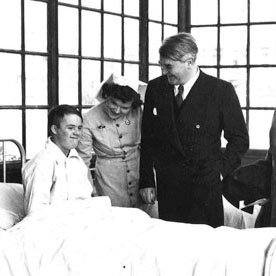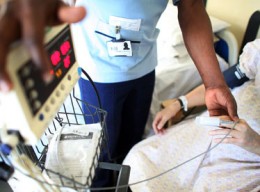 On 5th July this year, the NHS- National Health Service, marked its 65th birthday. It was launched in 1948 with an aim of making healthcare available to all people. It is funded from taxation, which means healthcare is free. This saw a surge in health care jobs and a reform in the medicine field. Let us walk through the history of the most comprehensive and largest healthcare service that is publicly funded in the world. The NHS has shown remarkable growth over the years.
On 5th July this year, the NHS- National Health Service, marked its 65th birthday. It was launched in 1948 with an aim of making healthcare available to all people. It is funded from taxation, which means healthcare is free. This saw a surge in health care jobs and a reform in the medicine field. Let us walk through the history of the most comprehensive and largest healthcare service that is publicly funded in the world. The NHS has shown remarkable growth over the years.
1952 – Prescription Charges
In 1952, the NHS began charging 1 shilling for prescriptions, and later during the same year, 1 pound for dental treatment. Prescription charges were abolished in 1965, but re-introduced 3 years later.
 1953 – The Structure of the DNA
1953 – The Structure of the DNA
Francis Crick and James D Watson were able to come up with the structure of the DNA. This was a huge milestone in the study of diseases related to defective genes.
1954 – Smoking as a cause of Lung Cancer
Sir Richard Doll discovered that smoking was what caused lung cancer. He was so astounded by his findings that he quit smoking himself.
Introduction Of Daily Visits For Children
Two paediatricians, Sir James Spence and Alan Moncrieff, were against the idea of placing children in adult wards, where they were allowed to see their parents for just an hour on Saturday and Sunday. They said it was traumatizing, considering the fact that they may never even know why they are in the wards in the first place. They advocated for daily visits by parents. Today, parents can even stay with their children overnight.
1958
– Vaccination against Diphtheria and Polio was introduced.
1960 – The First Kidney Transplant
The first kidney transplant in the UK was done on 30th October at Edinburgh Infirmary. The patient was 49, and it was his twin that donated the kidney.
1961 – Contraceptives
The contraceptive pill was introduced to help women in suppressing fertility. It was initially available to married women, but 6 years later, even unmarried women could access it. By 1969, 1 million women were using it.
1962
– The first full hip replacement.
– Professor John Charnely studied wear and tear in hip post-mortems and successfully carried out the first full hip replacement at Wrightington Hospital.
1967- The Salmon Report
It suggested that doctors should be grouped according to their specialty, and a structure be put in place for professional staff in hospital. It also echoed the need for change in the 3 structures of the NHS.
1967 – Abortion Act
It was introduced to legalize abortion up to 28 weeks if carried out by a professional doctor, and if in best interest of the parent. It became law the following year. The act never got to Northern Ireland. The period before termination was reduced by 4 weeks.
1968- The First Heart Transplant
Donald Ross, a native South African, successfully carried out the first heart transplant in Britain at the National Heart Hospital in London.
1972- CT Scans
The concept of CT scans was birthed by Godfrey Newbold Hounsfield in 1967 and actualized in 1972. He won a Nobel Prize for it, alongside Allan McLeod Cormack.
1975- Endorphins
John Hughes and Hans Kosterlitz discovered the all happy endorphins. They relieve pain and improve one’s mood.
1978
– The world’s first test tube baby was born after her mother failed to conceive due to blocked fallopian tubes.
– The first successful bone marrow transfer on a child was done.
The ’80s
– Introduction of MRI scans for soft tissues, for instance, the brain.
– The first keyhole surgery is done successfully.
– Inequality based on financial status and race in the NHS was highlighted David Ennals.
1981
– Improved healthcare for babies resulted in lower infant mortality rates and healthier babies and mothers in general.
1986
– The first AIDS campaign was launched.
1987
– The first liver, heart and lung transplants successfully carried out by Professors John Wallwork and Roy Calne.
1988
– Breast screening was introduced.
The 1990s saw the establishment of NHS trusts, the setting up of an organ donor register, and the launch of an e-health service.
The 2000s saw the introduction of walk-in centres, gene therapy, patient choice for up to 4 service providers, launching of bowel cancer screening, vaccination against pneumococcal meningitis, launching of the NHS website, banning of smoking in public places, a robotic arm to help in surgery, HPV vaccination, and Change4 life campaign which was against weight loss.
Today, major changes in structure, decision-making, and services are on going. There are more roles than ever before within the NHS, including Doctors, Midwifery, Dental, Ambulance Service Team, Health and Social Care Nursing, Pharmacy, and much more. It is the hard work and determination of these individuals who have brought the NHS from its humble beginnings to what it is today.

 Health and social care work is a challenging but still a highly rewarding career. The major advantage of being involved in this kind of work is it’s being broad in nature such that there are many job opportunities available. For instance,
Health and social care work is a challenging but still a highly rewarding career. The major advantage of being involved in this kind of work is it’s being broad in nature such that there are many job opportunities available. For instance,  The Health and Social sector plays a vital role in caring for the elderly and disabled in society. Caring for those who are not able to care for themselves and giving family members, who are full time carers, a break from time to time. Candidates applying for Social Care jobs will apply for vacancies depending on the areas they wish to specialize and have an interest in. There are a number of academic qualifications that need to be obtained before being considered for a role in the health and social sector, and a number of these can be obtained from secondary school and college when undertaking full-time or part-time courses. Examples of qualifications include a Level 1 Award and Level 1 certificate in ‘Introduction to working in Health, Social Care and Children’s and Young People’s Settings’ which can then be followed by a Level 2 and Level3 certificate in ‘Preparing to Work in Adult Social Care’. There are a range of different qualifications that can be obtained in health and social care. In addition to this, NVQ’s can be obtained from a college or A-level course and there are additional health and social care courses that can be completed.
The Health and Social sector plays a vital role in caring for the elderly and disabled in society. Caring for those who are not able to care for themselves and giving family members, who are full time carers, a break from time to time. Candidates applying for Social Care jobs will apply for vacancies depending on the areas they wish to specialize and have an interest in. There are a number of academic qualifications that need to be obtained before being considered for a role in the health and social sector, and a number of these can be obtained from secondary school and college when undertaking full-time or part-time courses. Examples of qualifications include a Level 1 Award and Level 1 certificate in ‘Introduction to working in Health, Social Care and Children’s and Young People’s Settings’ which can then be followed by a Level 2 and Level3 certificate in ‘Preparing to Work in Adult Social Care’. There are a range of different qualifications that can be obtained in health and social care. In addition to this, NVQ’s can be obtained from a college or A-level course and there are additional health and social care courses that can be completed. When it comes to career paths, there are not many that provide a better feeling of satisfaction than that in the health and social care industry. Not only are you caring for people suffering with disabilities and illnesses, you are also supporting their families through difficult times whilst growing as a person yourself. There can be no bigger reward than that. There are also so many different career journeys to take in the health and social care industry, where each area requires specially trained personnel to work to the highest standards to ensure that the highest level of care is given to patients.
When it comes to career paths, there are not many that provide a better feeling of satisfaction than that in the health and social care industry. Not only are you caring for people suffering with disabilities and illnesses, you are also supporting their families through difficult times whilst growing as a person yourself. There can be no bigger reward than that. There are also so many different career journeys to take in the health and social care industry, where each area requires specially trained personnel to work to the highest standards to ensure that the highest level of care is given to patients. A career in health and social care (especially nursing) is a rewarding one. Not only are you giving back to society, you are also changing the lives of others for the better. There are a number of career paths that individuals can take, whether it is the biology, nutrition or other aspects of health and social care. This article will focus on the careers available in nursing. There are different areas of nursing to explore; each requires a different knowledge and understanding along with a varied set of skills. So what sorts of skills are required for certain areas of nursing?
A career in health and social care (especially nursing) is a rewarding one. Not only are you giving back to society, you are also changing the lives of others for the better. There are a number of career paths that individuals can take, whether it is the biology, nutrition or other aspects of health and social care. This article will focus on the careers available in nursing. There are different areas of nursing to explore; each requires a different knowledge and understanding along with a varied set of skills. So what sorts of skills are required for certain areas of nursing? A career in Nursing is a challenging yet rewarding one. There are many benefits to nursing, one of the greatest feelings you could have is knowing that you have helped change someone’s life for the better whilst in your care. Not only will you be able to put the skills you have been taught into practice, there are many areas of nursing in which you could pursue, whether it is in a hospital, clinic or doctors practice. The role does have its downfalls, with long hours and short staffing, but these downfalls are easily out weighed by the satisfaction you get of helping improve peoples lives on a daily basis. There are a high number of jobs in nursing available, so it is up to you to find the right one for you.
A career in Nursing is a challenging yet rewarding one. There are many benefits to nursing, one of the greatest feelings you could have is knowing that you have helped change someone’s life for the better whilst in your care. Not only will you be able to put the skills you have been taught into practice, there are many areas of nursing in which you could pursue, whether it is in a hospital, clinic or doctors practice. The role does have its downfalls, with long hours and short staffing, but these downfalls are easily out weighed by the satisfaction you get of helping improve peoples lives on a daily basis. There are a high number of jobs in nursing available, so it is up to you to find the right one for you.